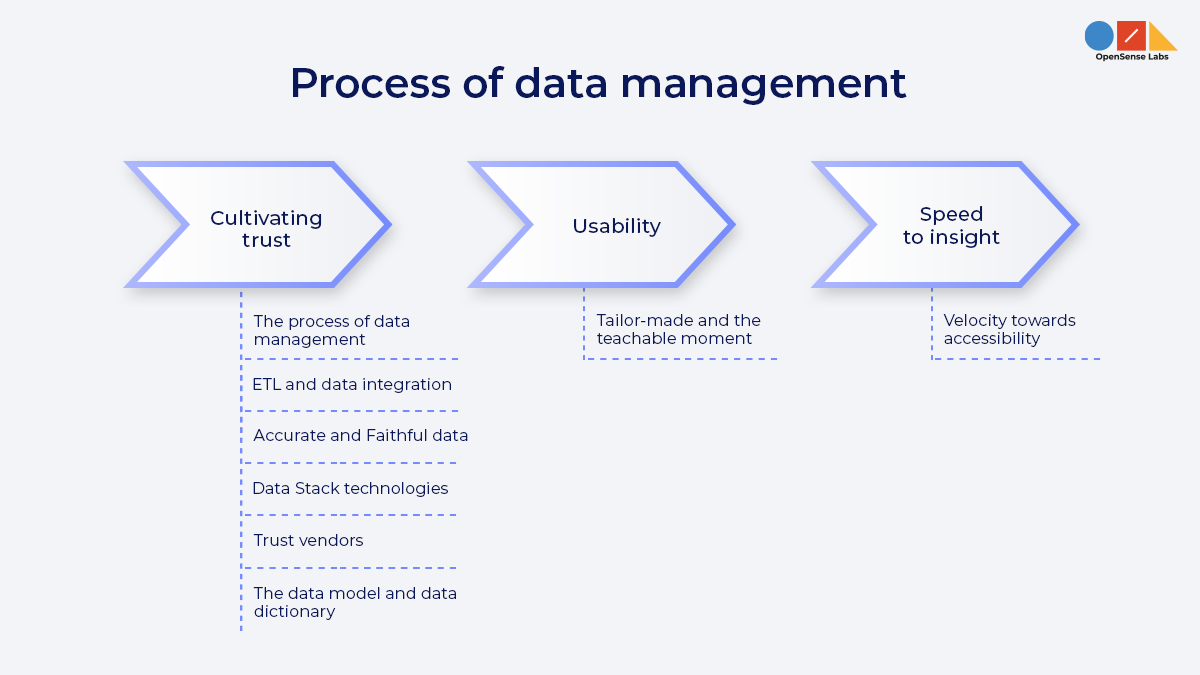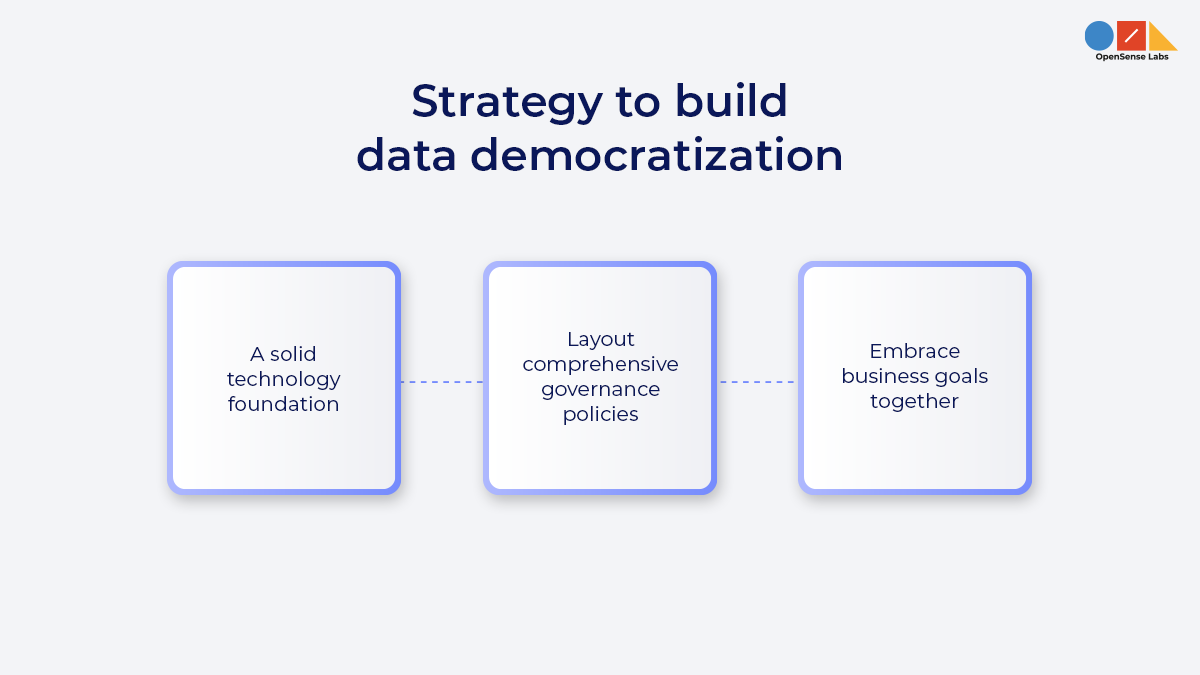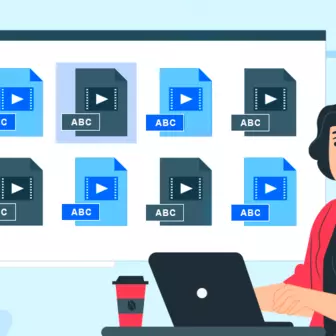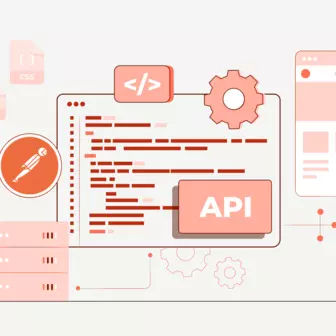Information technology has always been a task of software developers or technical people. Apart from IT, other departments were not indulged in the practice of data collection and it has always been kept in the hands of a few data analysts.
But with changing times, it has become important for every enterprise to have an easy flow of information among all the departments to avoid disruption.
But how is this flow of data going to be maintained?
How non-technical people would understand data analytics?
All this will be explained with the concept of data democratization in this article. Let’s roll to get a glimpse of data culture.
Democratization of Data: The key to innovation
A business is called a complete organization where each and every department is aware of the information flow. It’s when the entire organization is involved in making business decisions every day using and understanding the readily available and relevant data. That is what we call Data democratization.
It is a process that means everybody has access to data and there are no blockers and the goal is to utilize data without any barrier.
Data democratization creates more data-driven organizations.
Moving forward, data democratization is defined as the top tech trends for enterprises in 2020 by Gartner. They believe it has the potential to manage the big data and can bring a change in the business models for the future.
Three pillars of data democratization

Data Access
Most crucial step in democratizing data for enterprises. It’s basically a converged view of all your structured, unstructured, and cloud data to allow seamless access to all your information which is called Data fabric. This will help in achieving faster insights with less complexity and cost.
Machine learning
The approach to data access requires significant technical skills and that is why machine learning is paramount. It helps to understand your users, how they will access the information, and most importantly how you will keep their data secure.
Deployment
After building data fabric and enabling machine learning to gain insight, it is vital to deliver these insights back to the business. The final step of democratizing is to achieve real value back to business.
Process of data management

Cultivating Trust
A dedicated team is always preferred for the development and oversight of the data and there should be a sense of trust among the team at the onset of any data analytics project. Some of the factors that one should keep in mind to reinforce trust are, Process of data management which means there should be a process of agility and ability to have data jobs.
The other process is Extract, Transform, Load to pull the raw data required for analysis, convert and prepare it in some useful form of information. With data management, the end goal is to expose the relevant data to the users which can be done by the data model and data dictionary.
Any data that is new or changed should be loaded and decrease the latency as well. Accurate data collections should be in process to reduce the volume. The goal of data analytics stack is to equally build a stack that provides end users a 360-degree view via data. At last, all this depends on trust in data vendors.
Usability
Embracing data democratization requires leadership and governance and if the end-user does not understand or cannot apply what they have now been granted access to, the usability of information becomes rapidly to zero. It should be tailored to suit the needs of users.
Speed to Insight
Failure to adopt data on time increases the disruptions therefore it is necessary that data should be accessible within a specific time frame to avoid delays.
Data democratization to accelerate business development
Lydia Clougherty Jones, Senior Director Analyst, Gartner, quoted that data sharing is the way to optimize higher-relevant data, generating more robust data and analytics to solve business challenges and meet enterprise goals.

The bigger question that strikes our mind is how can organizations trigger innovation across all levels and functions without sharing the information and making it reliable for every team member. How can they meet the growing and frequent demands for new products with limited IT resources?
Well, data democratization is the answer to all the queries.
The traditional mindset of “do not share data unless required” has been changed. By sharing data as a business necessity, business leaders will be able to achieve the goal easily. To achieve goals you have to introduce trust throughout the data sharing process to avoid complications and have transparency.
Leaders from HCL Technologies and Talend in the conversation for actionable insights around data democratization:
Rise of citizen developers
Let me highlight one important aspect of data democratization i.e citizen developers, who are basically users who create new business applications using runtime environments sanctioned by corporate IT. Through this, the users can build applications using available data. Citizen development can help businesses to build solutions that organizations need at a faster pace with less rework.
How to build seamless data democratization strategy
Here are three approaches to tackle data democratization:

A solid technology foundation
Building a strong technical environment to democratize data, intelligence, and software throughout the organization is essential. Leaders should keep in mind that to redevelop enterprise architecture that needs to be easy, flexible, and affirmative to carry out innovations. They should focus on making strategic investments in toolsets that will perform the functions.
Embrace business goals together
To have a transparent flow of data, businesses should encourage the team members to have a common goal that will be driven by business priorities. Businesses should elevate the roles and responsibilities of team members so that it will increase participation.
Layout comprehensive governance
To avoid disruptions and hustle in the data sharing every process needs to be governed by expert groups. Comprehensive governance policies should be carried out by businesses to democratize data in an efficient way.
Tech tools that propel data democratization
Data democratization is now more attractive because of its incredible nature to create data in a huge manner which we often refer as Big Data. In addition, there have been so many tech innovations that help make sense of the data for non-technical people.

Data virtualization software
Without knowing any technical details, data virtualization software retrieves and manipulates data. It helps in circumventing the issue of needing to clean up inconsistencies in data or file formats.
Data federation software
Data federation is one such method that uses metadata to aggregate data from a variety of sources into a virtual database.
Cloud storage
To avoid information inaccessibility, organizations use cloud storage as a central location to store data. It basically heightens the security of data sharing.
Self-service BI applications
Self-service BI applications make things easier for non-technical users to intercept data analysis. With technological advancements, we can now explain the data to non-IT people.
Does your business need data democratization?
The ultimate goal for every business is to create a seamless experience for end-users and for that data democratization is a must. Data democratization is the future of managing big data and revolutionizing business decision-making.
Businesses that are armed with the right tools and have a clear understanding of data democratization are leading the market because they are arming all their team members with the wholesome knowledge required to take decisions and provide an impeccable user experience. For every business data, democratization is necessary to achieve high-end results and to have a structured flow of information inside the organization.
Here you can see some success stories of data democratization,
In the video, you can see how Cisco won the 2020 SuperNova award for its data democratization:
Airbnb achieved data democratization to empower 5k+ employees:
Conclusion
The biggest challenge in digital transformation is helping everyone learn to use data effectively and make the most out of it. Empowering users to be more proactive in exploring their assumptions and more innovative in bringing those insights to life and data democratization is one such way where non-technical people can win the race of data accessibility and can provide fruitful outcomes easily.
Subscribe
Related Blogs
Trek n Tech Annual Retreat 2025: A 7-Day Workcation of OSL

OSL family came together for the Trek n Tech Annual Retreat 2025, a 7-day workcation set amidst the serene beauty of…
Exploring Drupal's Single Directory Components: A Game-Changer for Developers

Web development thrives on efficiency and organisation, and Drupal, our favourite CMS, is here to amp that up with its…
7 Quick Steps to Create API Documentation Using Postman

If you work with API , you are likely already familiar with Postman, the beloved REST Client trusted by countless…




